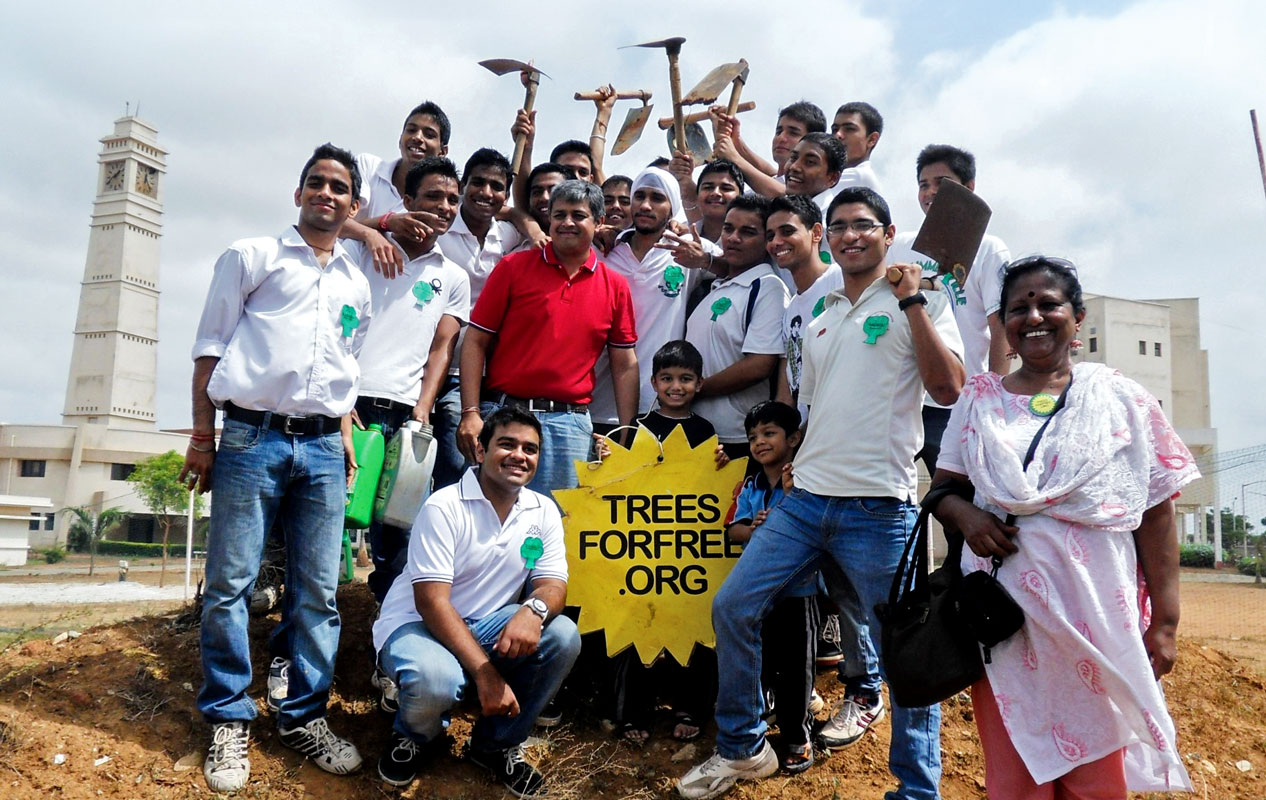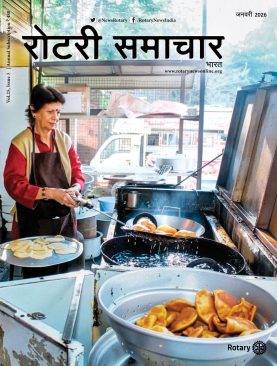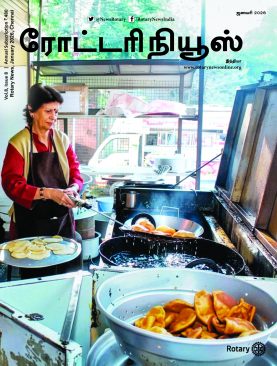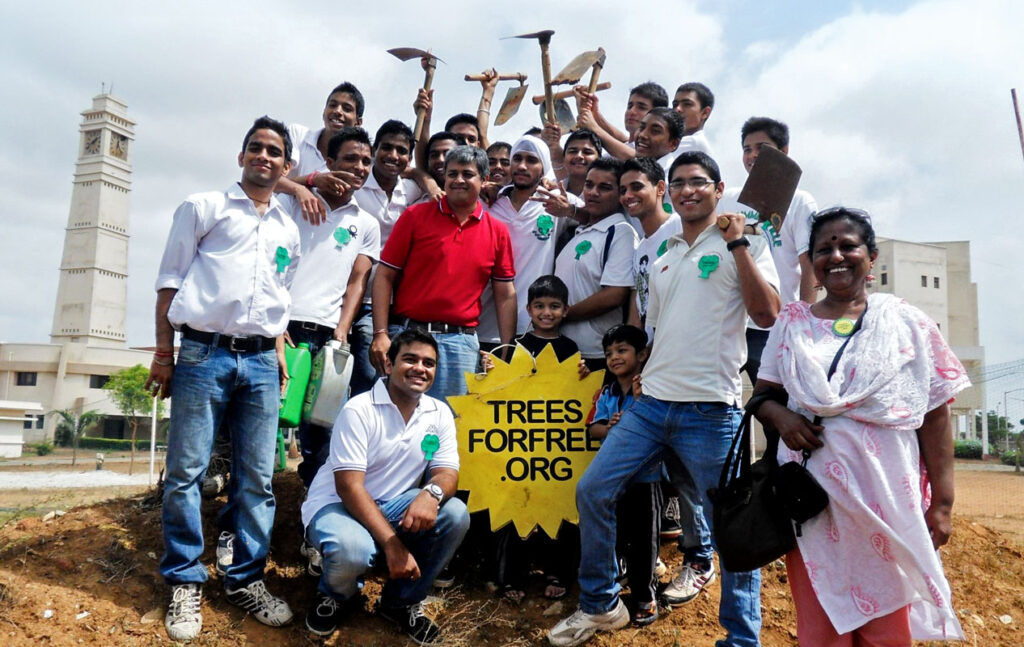
Give a gift that keeps giving…. This is the motto of the charitable trust that Janet Yegneswaran, a past president (2017–18) of the Rotary Club of Bangalore Koramangala (RCBG), RID 3191, set up in memory and name of her late husband Rajanet Yegneswaran, a Rotarian of the same club, some 20 years ago.
The gift mentioned here is a tree, and her efforts over two decades have helped in the planting of over 97,000 trees in Bengaluru, rest of Karnataka and even Tamil Nadu. Apart from greening our planet and saving the ecosystem for future generations, these trees, planted through different projects such as agroforestry, giving succour to the victims of natural disasters, creating a ‘food forest’ on barren land etc, have given hope to thousands of people.
This work through her project called Reforest India has also helped her forge a partnership with a corporate like Bosch India, which has put her in charge of a community development centre supported by it in the Anekal region of Karnataka, which operates in some 30 villages. This centre works in areas such as computer education for poor children, activities that promote empowerment of women, greening the earth, and so on.

Deeply engrossed in community work, and constantly on the move to gauge the needs of the local community, her recent discussion with the representative of the Bosch India Foundation, led to a healthcare project by her club. “I was telling them about the lack of healthcare facilities in Gowrenahalli, a village about 30km from Bengaluru. And they expressed interest in doing a mega medical camp in the village in partnership with our club.” As the community services director of her club for seven years, before she became club president in 2017–18, this Rotarian has a lot of experience in conducting rural health camps in villages.
Janet’s efforts over two decades have helped in the planting of over 97,000 trees in Bengaluru, rest of Karnataka and even Tamil Nadu.
In this health camp, attended by 132 villagers, a good number of dental, eye and other medical problems were detected by the team of doctors who did the screening. Dental problems such as filling of cavities, extraction of problematic teeth and cleaning of teeth were attended to. Screening was also done for defective vision and other eye ailments and 40 people were prescribed spectacles “which will be given free by the club. Five cataract patients were identified and our club members will also support their operation, under our club’s avoidable blindness project,” she says.
An estimated ₹50,000 was spent at this camp where most of the work by the professionals was of a voluntary nature; the cost was shared by the club and the Foundation.
But other incidental fallouts from this project are more important. One was that while organising this camp, volunteers from the Bosch Foundation went “from house-to-house inviting residents to the camp, assisting the physician with blood pressure measurements, distributing medicines, documenting patient details, etc. They were really enthused by this kind of community service work; this was a first-of-its-kind work for them, and I am sure that this will encourage at least some of them to become future Rotarians, because they have now got a taste of the kind of work Rotary does,” says Janet.
She herself, while talking to the local panchayat leaders, found that a village primary school here, with 100 children, requires a lot of work. “The building, including the toilets, requires renovation and painting. That itself will cost some ₹4 lakh. The students do not have desks and benches. Panchayat members told me that many schools in this area require renovation. The toilets in two schools with 500 students in both the Kannada and Urdu medium are in very bad shape and require rebuilding.”
Janet plans to visit 30 schools in the region and collect details of the work and funds required. “Our medical camp has highlighted the urgent need for repairing the dilapidated and dingy-looking school buildings in the taluk. We hope that once you write this article in Rotary News, it will inspire other Rotary clubs in our region, corporates and other stakeholders to contribute towards the renovation of these critical educational facilities, making a meaningful impact on the lives of the children and the community as a whole. We are witnessing first-hand the vast potential for Rotary’s service in village areas, as there is considerable scope for impactful projects in rural India,” she adds.
Greening initiatives
Meanwhile, her passion for greening the earth continues. Her charitable trust’s work done so far has been in different categories. The first is agroforestry where up to 10 fruit trees are planted on the “periphery of the land belonging to marginal farmers so that they can continue cultivation and also get extra income from fruit trees… local fruit and coconut trees.”
In another scheme, trees are planted in areas affected by natural disasters. “We planted 2,000 coconut trees in 2019 in Thanjavur for the farmers who had lost coconut trees during the Gaja cyclone, and 1,000 fruit and forest trees a little earlier on the banks of Cauvery river when it experienced continuous landslides,” says this passionate environmentalist.
An interesting project done by her Trust is starting a Food Forest on a six-acre barren land “neglected by farmers, which has already started yielding results. While planting trees in villages, we noticed a lot of land lying barren because the farmers were unable to afford the infrastructure required for sustainable farming and the government schemes did not reach them due to lack of education and the intervention of middlemen.”
So this ‘food forest’ was planted on a neglected farmer’s land in Kadenahalli village in the Kolar district of Karnataka. “We started from scratch, reinforced the fencing, rejuvenated the borewell, built a water storage body, tilled and levelled the land, refurbished the watchman’s shed, and irrigated the land with drip and sprinklers.”
Various types of fruit trees and flowering bushes were planted and bee boxes put up. The area between the fruit trees is being cultivated with vegetables, greens, etc. This has been created as a model integrated farm to build awareness and give training to farmers and others who are interested. Inhouse training has also been given to interns of XIME College in Bengaluru (https://youtu.be/JhKv8ScSg_Y). Corporate volunteers also come and give shramdaan for the Foundation’s greening initiatives.
A champion whose 20-year efforts have seen over 97,000 trees springing to life, including at the Army Institute of Fashion Design, schools, colleges and residential complexes, Janet says she strictly follows a couple of norms for planting trees. “We only go to places where people are there to look after the trees we have planted, and more important, a water source is available to sustain their growth. And we keep track of every tree planted.” The trees planted by her team are flourishing on Indian Army, Air Force and Railway land, in schools, colleges, government buildings, and gated communities where resident welfare associations undertake the responsibility of looking after the trees.










